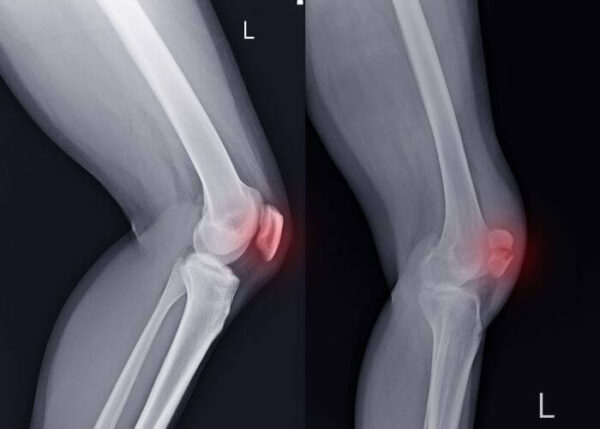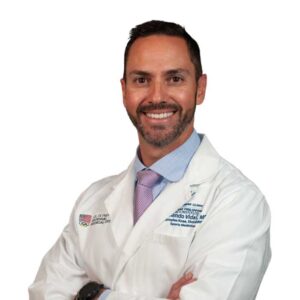What is a dislocated knee?
It sounds horrible and can be quite painful but luckily, knee dislocations are fairly uncommon. When they do happen, however, this complex knee injury is extremely serious. A dislocated knee occurs when the femur (thigh bone) and tibia (shin bone) are forced out of their contact with each other. Different from a patella dislocation, where the kneecap dislocates from the groove in the femur, a dislocated knee requires immediate surgical intervention. Very few surgeons have experience or comfort managing these injuries. Complex knee specialist, Dr. Armando Vidal treats patients in Vail, Aspen and the surrounding Denver, Colorado communities who have experienced complex knee injuries, including a dislocated knee.

What causes a knee dislocation?
A knee dislocation is a high-energy injury. It can occur from a traumatic fall, severe sports injury or a high-speed car accident. A dislocated knee can reduce (go back into place) on its own, but this is rare. Instead, patients typically require expert medical attention to reduce these injuries.
Why is a dislocated knee considered a complex knee injury?
When the knee forcibly dislocates, additional injury can occur to the ligaments that help hold the knee in place. These ligaments are called the ACL, PCL, MCL and LCL. In addition, there may be injuries to the medial or lateral meniscus, the articular cartilage or a patellar tendon injury. Fractures can also occur from an injury this severe.
Because a lot can go wrong when a knee dislocates, it is very important to have the injury carful assessed by Dr. Armando Vidal. The mechanism of injury needs to be considered along with x-rays, an MRI scan and other studies as necessary to correctly assess and correct the damaged knee joint. For more severe knee dislocations, a CT angiogram may be needed to determine if a potential popliteal artery injury exists.
What are the symptoms of a dislocated knee?
Because as many as 35% of all dislocated knee injuries include nerve damage, the common peroneal and tibial nerves need to be evaluated at the time of injury. Some of the associated symptoms include:
- Severe pain
- Numbness below the knee
- Physical deformity or crooked appearance
- Diminished or absent pulse in the popliteal artery (behind the knee)
How is a knee dislocation treated?
The first and most critical step in the management of a knee dislocation is getting it back into place. The longer the knee is dislocated, the greater risk of injury to the joint and the surrounding neuro-vascular structures.
After this first, urgent and necessary step, an expert evaluation is needed to determine timing and details of surgery.
For patients in Vail, Aspen and the surrounding Denver, Colorado communities, knee dislocation surgery is best done by a surgeon who perform this specialized surgery regularly and repeatedly. Dr. Vidal is well versed in treating knee dislocations and their varied injury patterns. He also has a large and varied supply of allograft ligaments for reconstruction, and a surgical team which is very talented at The Steadman Clinic.
Does a knee dislocation require surgery?
Most knee locations require surgery. Severe and traumatic dislocations, such as a complete tibiofemoral dislocation, requires emergency surgery. The arterial supply of the knee and the underlying nerve status of the knee need to be clearly checked and corrected during surgery. A complete workup, to ensure that an arterial injury is not present is essential. Lower velocity injuries can cause recurrent problems with knee instability due to torn ligaments that occurred with the dislocation and also require surgery.
How long does it take to recover from a knee dislocation?
Due to the complex nature of a knee dislocation and the associated ligament and cartilage damage, the recovery time for this complex knee surgery can be quite long, varying from 9-15 months in some cases. This can be dependent upon the patient’s age, goals and other factors. Associated vascular and neurologic injury can further delay return to activity and complicate this recovery.
Complex Knee Specialist
Knee dislocations are relatively uncommon knee injuries that can occur from a traumatic injury, such as a car accident, or a severe sports injury. Knee dislocations can have serious consequences, so it is extremely important to see a professional if you believe you have dislocated your knee. Complex knee specialist, Doctor Armando Vidal provides diagnosis as well as arthroscopic stabilization surgery for patients in Vail, Aspen, and the surrounding Denver, Colorado communities who have experienced a severe knee injury. Contact Dr. Vidal’s team today!

Locations
180 S Frontage Rd W
Vail, CO 81657
226 Lusher Court
Ste 101
Frisco, CO 80443
322 Beard Creek Road
Edwards, CO 81632


